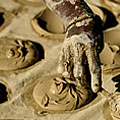040 - Galletas de lodo
||Schlamm
Cookies||mud
쿠키||진흙
040 - Schlammplätzchen
040 - Mud Crackers
040 - Biscuits de boue
040 - Biscotti al fango
040 - Purvo sausainiai
040 - Biscoitos de lama
040 - Грязевое печенье
040 - Грязьове печиво
Galletas de lodo
Cookies||mud
Mud cookies
Biscoitos de lama
HOMBRE
MAN
¿Comiendo tierra?
Eating|
먹는|
Eating dirt?
No, no me lo creo.
No|||it|I
No, I do not believe it.
Eso es una exageración…
||a|exaggeration
|||과장
That is an exaggeration ...
HAITIANA
Haitian
아이티의
HAITIANA
Galletas de lodo…
|of|
Mud cookies ...
Biscoitos de barro ...
Galletas de lodo…
Cookies||mud
Mud cookies ...
HOMBRE
MAN
Yo he visto pobreza…
|||poverty
||본|빈곤
I have seen poverty ...
나는 가난을 보았다...
Eu vi pobreza ...
pero… ¡comer tierra!
|eat|
but ... eat earth!
하지만... 땅을 먹는다고?
HAITIANA
HAITIAN
아이티의
Le ponen un chin de sal…
They||a|dash||
|주다||조금||
They add a pinch of salt...
소금을 조금 넣고…
Eles colocam um queixo de sal ...
aceite quemado… y ya está.
oil|burned|and||
기름|타는|||
burnt oil ... and that's it.
타낸 기름… 그러면 끝이에요.
óleo queimado ... e é isso.
HOMBRE
MEN
남자
No, no me lo creo.
||||believe
No, I do not believe it.
HAITIANA
HAITIAN
Galletas de tierra...
Ground cookies ...
HOMBRE
¿En qué lengua está hablando ésos?
|||||die da
In|||||those
||||말하고|그 사람들
In what language are those speaking?
저 사람들은 어떤 언어로 이야기하고 있나요?
LOCUTORA
여자 아나운서
Creole, el idioma del pueblo de Haití.
Creole||language||||
크레올||||||
Creole, the language of the people of Haiti.
크리올어, 하이티 사람들의 언어입니다.
Crioulo, a língua do povo haitiano.
HAITIANA
HAITIANA
Haití cherí…
|dear
|사랑하는
Haiti cherí ...
Haiti cherí ...
LOCUTOR
En creole se proclamó
In|in Creole||was proclaimed
|||선언되었다
In Creole it was proclaimed
Em crioulo foi proclamado
la primera independencia de América.
||independence||
|첫 번째|독립||아메리카
the first independence of America.
아메리카의 첫 번째 독립.
Haití fue el primer país libre
Haiti was the first free country
de nuestro continente, en 1804.
||continent|
of our continent, in 1804.
Pero ahora…
But now…
HAITIANA
Mi hijito tiene un mes…
|little son|||
My little boy has a month ...
HOMBRE
No, no me lo creo…
No, I do not believe it…
HAITIANA
Tengo las tetas secas, sin leche…
I||nipples|dry|without|
||가슴|||
I have dry tits, without milk ...
HOMBRE
MAN
No, no me lo creo…
No, I do not believe it…
HAITIANA
Le doy estas galletitas de tierra.
To|I give||cookies||
|||쿠키||
I give you these clay cookies.
LOCUTOR
ANNOUNCER
Haití, un pueblo que muere de hambre
Haiti||||dies||
||||죽다||
Haiti, a people dying of hunger
ante la mirada indiferente del mundo.
||look|indifferent||
앞에||시선|무관심한||
before the indifferent gaze of the world.
세상의 무관심한 시선 앞에서.
LOCUTORA
ANNOUNCER
여자 목소리
Las familias más pobres
The poorest families
가장 가난한 가정들
han tenido que recurrir a la tierra,
they have|had||resort|||
|해왔던||의지하다|||
they have had to resort to the land,
그들은 땅에 의지해야 했다,
al barro, al fango,
to the|mud||mud
|진흙||진흙
to the mud, to the mud,
진흙, 물엿에,
para a lama, para a lama,
como alimento diario.
||daily
as a daily food.
일상적인 음식으로.
HAITIANA
No alcanza ni pá un plato de arroz…
Don't|it's not enough||for||||rice
|도달하다||파||접시||밥
It does not even reach a plate of rice ...
밥 한 그릇도 안 된다...
Nem um prato de arroz chega ...
no alcanza…
doesn't|
it does not reach ...
pas assez ...
안 된다...
LOCUTOR
내레이션
Llevan el lodo a los mercados de Puerto Príncipe, la capital.
They carry||mud|||markets|||||
||진흙|||시장|||프린세페||
They carry the mud to the markets of Port-au-Prince, the capital.
Eles carregam a lama para os mercados de Porto Príncipe, a capital.
Dentro del laberinto de mesas
||labyrinth||tables
안에||미로||테이블
Inside the labyrinth of tables
Dentro do labirinto de mesas
con piltrafas de carne y moscas,
|scraps||meat||flies
|잡동사니||||파리
with scraps of meat and flies,
com pedaços de carne e moscas,
las mujeres compran lodo
the||buy|
||산다|진흙
women buy mud
y luego hacen las galletas
and then they make the cookies
e então eles fazem os biscoitos
para venderlas en la calle.
|to sell them|||
|판매하다|||
to sell them on the street.
HAITIANA
HAITIANA
Pá engañar el hambre…
For|deceive||hunger
|속이다||
Pá deceive the hunger ...
porque no alcanza.
because||because it's not enough
because it's not enough.
HOMBRE
Pero, por favor,
But please,
¿cómo van a comer eso?
How are they going to eat that?
La tierra tiene parásitos,
|||parasites
|||기생충
The earth has parasites,
toxinas industriales…
toxins|industrial
산업용 독소|산업용
industrial toxins ...
toxinas industriais ...
HAITIANA
Pá engañar el hambre…
To|deceive||
Pá deceive the hunger ...
LOCUTOR
¿Dónde está España y Francia,
Where is Spain and France,
que invadieron esta isla y arrasaron con ella?
|they invaded||||ravaged||
|침략했다||||황폐화시켰다||
who invaded this island and destroyed it?
LOCUTORA
ANNOUNCER
¿Dónde los Estados Unidos
Where the United States
que invadieron Haití en 1891, en 1914, en 1994?
|they invaded||||
who invaded Haiti in 1891, in 1914, in 1994?
LOCUTOR
Golpes militares gringos,
Golpes||Golpes militares estadounidenses
미국의 군사적 타격||미국인
Military coups gringo,
bases militares gringas,
bases|military|American
군사 기지||미국의
gringo military bases,
deudas eternas con los bancos gringos.
debts|eternal|||banks|Americans
빚|영원한|||은행|
eternal debts with the gringo banks.
HAITIANA
Galletas de lodo, eso comemos.
||||먹어요
Mud cookies, that's what we eat.
LOCUTOR
El hambre es un crimen
The||||
Hunger is a crime
que se comete cada día en Haití
||is committed|every|||
that is committed every day in Haiti
contra millones de seres humanos.
||of||
대항하여||||
against millions of human beings.
LOCUTORA
Y los criminales son los que
And|the|||the|
And the criminals are the ones
ayer y hoy
yesterday||
yesterday and today
saquearon y siguen saqueando a Haití,
they looted||they are looting|looting||
약탈했다|||약탈하는||
they looted and continue looting Haiti,
el país más empobrecido de América.
|||impoverished||
|||가난해진||
the most impoverished country in America.
HAITIANA
Haití cherí
Haiti cherí

